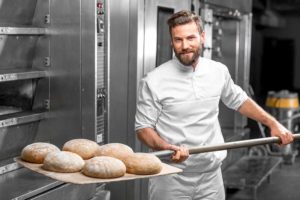Disclaimer: The information on our website is provided for general information purposes only. We make no representations or warranties of any kind, express or implied, about the completeness, accuracy, reliability, suitability or availability with respect to the website or the information contained on our website for any purpose. Any reliance on such information is therefore strictly at your own risk and we are not liable for any damages or losses arising out of or resulting from your reliance on any information contained on our website.
Bakers prepare doughs, batters, icings, or fillings and use scales or graduated containers to weigh or measure ingredients. They produce pie crusts, cookies, breads and other types of doughs by kneading, cutting, or rolling dough into specific shapes and sizes. They may bake and decorate their end product. For instance, some bakers may help with cakes or pastries. Watch a video to learn what a baker does:
How to Become a Baker

Though no formal education is required, many bakers complete long term training under the supervision of an experienced baker to gain the necessary skills to enter this occupation. This on-the-job training can last anywhere from 1-3 years. However, some individuals do attend technical programs or culinary school for formal training. They study nutrition, sanitation procedures, and basic baking. Some also earn safe food handling certificates.
Retail Bakers of America does offer certification to bakers in four different competencies areas. Those who decide to obtain this certificate must gain experience in addition to education prior to taking an exam to earn these credentials. Education can include anything for sanitation courses to professional development courses one has taken at any point in their career. The levels of certification include: Certified Journey Baker, Certified Baker, Certified Decorator, and lastly a Certified Master Baker.
Job Description of a Baker
Bakers are often working early mornings, late evenings, weekends, and holidays. Bakers are surrounded by ovens and work with a variety of baking tools and machines. They stand for long periods of time and work in very hot environments. Work can be stressful at times due to the demands for high quantities of baked goods or even trying to determine the right amount from day to day for smaller bakeries. An overabundance can cause profit losses if not sold and too little can cause customers not to come back. In addition this environment can be very noisy due to timers going off, pots and pans being banged, or industrial mixers running throughout the day.
Bakers can work in bakeries, grocery stores, and restaurants. However, some work in industrial and manufacturing settings working for companies that produce mass quantities of baked goods. A baker’s salary can range pending on how much experience and training one has. Unfortunately technology and industrial machines are starting to overtake this industry, therefore bakers have a slow occupational growth rate compared to other occupations.
Free Teacher and Student Resources
Harvard University offers a free Science and Cooking course on EdX.org. Also, you can pay a small fee to receive a certificate upon completion.
Baker Career Video Transcript
The aroma of fresh baked bread, cakes, and pastries is just one of the job benefits that bakers get to enjoy every day. From large-scale manufacturing bakeries to small retail shops, bakers work in environments that offer delicious scents. Bakers must become familiar with ingredients; measuring, weighing and combining them, and checking their quality. They use time and speed controls for mixers, blending machines, steam kettles, and ovens.
Bakers must follow instructions closely and stay on schedule to ensure products are properly baked and fresh when served or packaged. Commercial bakers work in manufacturing facilities—large-scale commercial bakeries—that produce breads and pastries, often at high speeds. They use large, automated machines, such as commercial mixers, ovens, and conveyors. They must carefully follow instructions for production schedules and recipes.
Retail bakers work primarily in grocery stores and specialty shops. They may take orders from customers, prepare goods to order, and produce a wide variety of flavors and sizes. Most retail bakers also clean their own work area and equipment and unload supplies. Long-term on-the-job training is the most common path to becoming a baker. Some bakers learn their trade through apprenticeships or by attending technical or culinary school for 1-2 years.
Article Citations
- Bureau of Labor Statistics, U.S. Department of Labor, Occupational Outlook Handbook, Bakers.
- National Center for O*NET Development. 51-3011.00. O*NET OnLine.

